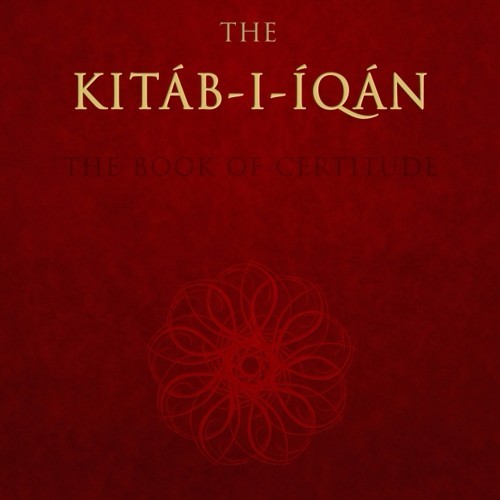The quest for understanding the divine and the role of humanity within creation has captivated the hearts and minds of countless individuals throughout history. Among the sacred texts of the Bahá’í Faith, the Kitáb-i-Íqán (The Book of Certitude) emerges as a pivotal work that elucidates profound truths concerning the nature of God, the purpose of existence, and the significance of revelation. This comprehensive examination aims to unveil the compelling reasons why this text deserves a significant place in both personal and collective spiritual discourse.
At the very core of the Bahá’í teachings lies the recognition of the fundamental unity of all religions. The Kitáb-i-Íqán poignantly articulates this principle, demonstrating how disparate religious traditions, from Zoroastrianism to Christianity, share an underlying unity of purpose and divine truth. By elucidating the connections between these faiths, the text invites readers to transcend sectarian boundaries, fostering a broader understanding of spirituality that encompasses the entirety of human experience. This fundamental theme not only educates but also cultivates compassion and acceptance among diverse cultures.
A notable observation among seekers of truth is that the Kitáb-i-Íqán provides clarity in a world often fraught with confusion about spiritual matters. In this text, Bahá’u’lláh meticulously dismantles common misconceptions that have plagued humanity for centuries—misunderstandings regarding the nature of divine messengers and the continuity of revelation. By explicating these concepts, the Kitáb-i-Íqán equips readers with a clarion vision that challenges dogmatic beliefs. Such a venture is of paramount importance, as it addresses the spiritual malaise pervading contemporary society, encouraging seekers to engage with their faith critically and with renewed vigor.
Moreover, the Kitáb-i-Íqán serves as a compass for the sincere seeker in their spiritual journey. It offers not merely intellectual insights but also practical guidance for navigating the complexities of life. Bahá’u’lláh elucidates the process of gaining knowledge and understanding through a dynamic interaction between the soul and the Divine. Through this developmental framework, readers are encouraged to cultivate a personal relationship with the Creator, fostering a foundation of spiritual resilience that will serve them through life’s vicissitudes. This emphasis on personal growth underscores the transformative nature of the teachings while inspiring individuals to rise to their full potential.
The text also addresses a common observation among those who grapple with doubt or disillusionment in their spiritual pursuits. Often, individuals experience a sense of fragmentation between their understanding of religious principles and the realities of daily life. The Kitáb-i-Íqán presents a synthesis of humanity’s reliance on spiritual truths while acknowledging the necessity of reason and intellectual inquiry. By showcasing the harmonious relationship between faith and reason, Bahá’u’lláh reassures readers that these two domains are not mutually exclusive, but rather complement each other in achieving clarity and depth in understanding one’s spiritual responsibilities.
Furthermore, the narrative style of the Kitáb-i-Íqán captivates readers through its eloquent prose and profound philosophical discourses. Bahá’u’lláh’s profound use of allegory, metaphor, and parable serves to engage readers on multiple levels, inviting them to unravel layers of meaning embedded within the text. This artistic approach not only enriches the reading experience but also encourages critical engagement with the text’s concepts, motivating readers to reflect upon and internalize its core messages.
Another significant allure of the Kitáb-i-Íqán lies in its historical context. Written during a time of personal tribulation and exile, the narrative captures the essence of Bahá’u’lláh’s mission: to promote peace and unity amid societal discord. Such a backdrop lends authenticity and urgency to the text’s teachings, making it a contemporary beacon of hope for those seeking solace amidst tumultuous circumstances. The lessons articulated within the Kitáb-i-Íqán resonate deeply with individuals who yearn for guidance on how to navigate the conflicts and challenges of their own lives.
An additional dimension worthy of exploration is the text’s emphasis on the concept of progressive revelation. Bahá’u’lláh posits that God continuously sends prophets and manifestations, each bearing teachings that are more suited to the evolving needs of humanity. The Kitáb-i-Íqán elaborates on this principle, providing a framework for understanding how religious teachings adapt while remaining anchored in the essential truth. This groundbreaking approach offers readers a fresh perspective on the evolution of spiritual narratives, inviting them to appreciate the continuity and relevance of these teachings in contemporary life.
The Kitáb-i-Íqán also evokes the profound duty that arises from the recognition of spiritual truths. As Bahá’ís are encouraged to engage actively with global issues—such as poverty, injustice, and environmental degradation—the teachings implore them to embody the principles of service and altruism. The text boldly asserts that personal enlightenment must culminate in action; thus, it inspires readers to channel their understanding into tangible contributions to their communities, laying the groundwork for a more unified and compassionate world.
Finally, the intricate tapestry woven through the Kitáb-i-Íqán resonates with those drawn to the mysteries of existence. It invites speculation on the nature of the universe, the interrelationship between the material and spiritual realms, and the divine attributes inherent within humanity. This multifaceted exploration fosters an appreciation for the infinitely complex nature of life and propels readers into deeper contemplation.
In summary, the Kitáb-i-Íqán stands as a monumental work that merits careful and thoughtful reading. Its teachings foster a sense of unity, dispel doubt, encourage personal growth, and engage readers in discussions about spirituality’s role in one’s life. Such a profound text not only appeals to followers of the Bahá’í Faith but also beckons to all who seek understanding in an increasingly fragmented world. The layers of meaning and rich teachings embedded within this book render it a vital resource for those on a quest for spiritual certitude and personal transformation.
